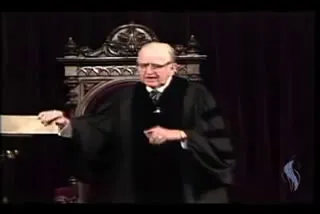
How C. S. Lewis’s Words Restored His Faith
Military veteran Jeremiah Braudrick shares how encountering the works of author C. S. Lewis rejuvenated his dormant faith.
View Transcript
Hello Guideposts. My name is Jeremiah Braudrick and this is my story of how C. S. Lewis impacted my life in a profound way.
I grew up in a very fundamentalist atmosphere, one that claims that if you do really well, God loves you. If you do bad, if you mess up, God’s mad at you. God is angry at you.
I joined the Marine Corps right out of high school, and by that point, I had given up on my relationship with God. I convinced myself not that God doesn’t exist but that I’m just not going to be able to make Him proud, no matter what I do. I put down my Bible and I didn’t pick it up for years after that.
C. S.Lewis was an atheist. When he went to war, he served in World War I. And here’s a line that C. S. Lewis wrote about his experience in World War I. He wrote, “The frights, the cold, the smell of AG,” which is high explosive, “the horribly smashed men still moving like half-crushed beetles, the sitting or the standing corpses, the landscape of sheer earth without a blade of grass.”
He had a very negative view of war at that time, but he had a very negative view of God, and his experiences in war certainly didn’t help his atheism. C. S. Lewis on his way back to London after being wounded and after taking a train ride and observing the scenery, the beautiful scenery, in contrast to that he just left in the battlefields of France, he had a moment for the very first time in his life, where—well, since a child—where with this beauty right in front of them, it opened up his mind that there might be a God after all.
Towards the end of my military career, I read this quote, just out of nowhere, “I have found that the degrees of shame and disgust which I actually feel on my own sins do not at all correspond to what my reason tells me about their comparative gravity. Our emotional reactions to our own behavior are of limited ethical significance.”
So I researched who actually wrote that quote just because it perked my curiosity and it said C. S. Lewis. I thought, C. S. Lewis, isn’t that the guy that wrote Narnia, the children’s books?
Lewis wrote, “My idea of God is not a divine idea that has to be shattered from time to time. He shatters it himself. Could we not almost say that this shattering is one of the marks of his presence?” And the idea that I can shatter and rebuild my view of God and I can shatter and rebuild the small Sunday school fundamentalist God and rebuild it into something beautiful of God, who actually loves me despite my mistakes and despite my failures, it was very nourishing to a soul who desperately needed to be nourished.










